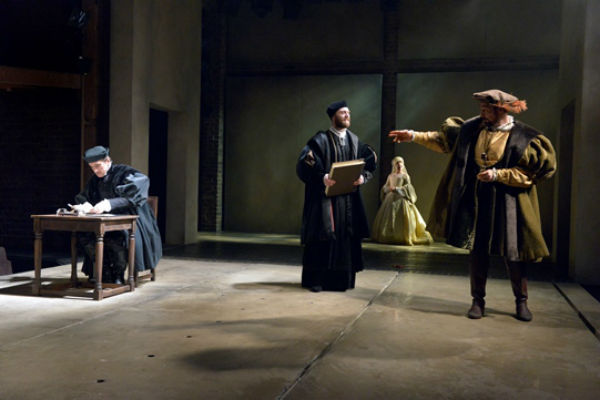Bring Up the Bodies at the Aldwych Theatre

Expectations are running high in advance of Bring Up the Bodies following the incredible opening of the prequel Wolf Hall. Knowing the outcome does not by any means lessen the suspense, and the buzz from the audience is greater than at the outset of the first.
The ominous opening, with Thomas Wyatt’s Whoso List to Hunt and an assembly of the whole cast, sets the scene for nearly three hours of dramatic and sincere theatre. Cromwell (Ben Miles) comes into his own in this – there is far more grit than in Wolf Hall, revealing the innermost thoughts behind his scheming. Miles is truly outstanding, his portrayal of Cromwell’s unbending ambition driving the story.
In this dazzlingly observed adaptation of the later years of Cromwell’s reign of power in the court of Henry VIII (Nathaniel Parker), the horror of the history is never far out of mind. The cast swirl and sliver around each other, building to a crescendo as the new Queen falls from favour and her former friends scramble to distance themselves.
There is an incredible sense of power play, characters’ movement and speech individually crafted. Cast members taking multiple roles is almost indistinguishable, such is the quality of the acting. Jane Seymour (Leah Brotherhead) is very likeable and allowed to play the significant part she holds in history, while Nicholas Day’s Norfolk is hysterical, evocative of the high theatrics of the Tudor court. Lucy Briers deserves special mention as both a convincing Katherine of Aragon and the antagonistic but long-suffering Lady Rochford.
The lighting is subtle but extremely effective in this production, easily shifting the audience between moods and locations, and the script is of the highest order – it has been meticulously adapted and flows, as if naturally, from page to stage.
The power in the second half of Bring Up the Bodies shifts to Cromwell and away from the King, illustrating Mantel’s pinpoint on one of the most powerful men in English political history, and placing him clearly at the centre of Anne Boleyn’s infamous downfall. Silence lays thick and heavy on the audience during Smeaton’s confession, hammering home the terror of the times and the whims of an indulged King. Henry’s signing of the death warrants of his wife and his friends provides the most moving scene.
Riveting in its closing scenes, there are broken loyalties, the outrageous settling of scores and some golden lines. Quiet and solid ambition that has resonated from Cromwell throughout rises to the surface as the cog in this production. As a whole it has been perfectly pitched – what is remarkable about this is that, despite the overtones of revolution, religion and ultimate power, this play is about people. Charged, desperate and full of talent beyond measure, Bring Up the Bodies has a blood-curdling ending that can never be forgot.
Georgia Mizen
Photo: Keith Pattison
Bring Up the Bodies is at Aldwych Theatre until 6th September 2014. For further information or to book visit the theatre company’s website here.
Read our review of prequel Wolf Hall here.

























Facebook
Twitter
Instagram
YouTube
RSS